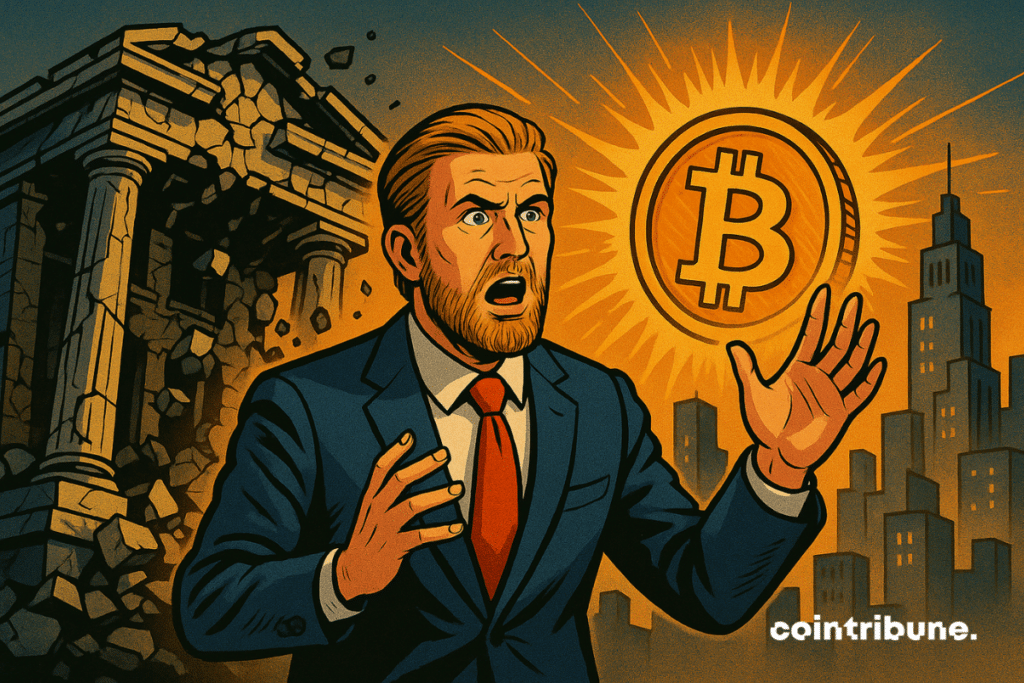Eric Trump’s Speech Puts Banks On High Alert
What if banks, the age-old pillars of global finance, were living their final years? This is not a warning from a crypto maximalist, but from Eric Trump. From the podium of Liberty University, the businessman warned: without rapid adoption of cryptos and blockchain, banks could disappear within a decade. Thus, in a context where decentralized finance is gaining ground, this stance reveals the flaws of a system frozen in the face of accelerating technology.

In Brief
- Eric Trump, son of the American president, warns that banks could disappear within ten years without a shift toward cryptos.
- During a speech at Liberty University, he denounces banks’ technological delay in the face of the rise of blockchain and decentralized finance.
- According to him, younger generations reject traditional banking institutions in favor of faster, transparent crypto solutions.
- Eric Trump’s statement raises questions about the future of the banking system, crypto regulation, and the evolution of the global financial landscape.
A Public Warning : Banks on the Hot Seat
It was during a speech at Liberty University, a flagship event for American conservatives, that Eric Trump sent a strong signal towards the traditional banking sector.
Facing an audience receptive to his ideas, he did not beat around the bush :
Traditional banks could be extinct within ten years if they do not adopt crypto.
This striking statement, made plainly, fits into a critique of the technological lag incurred by banks in a rapidly changing world.
Eric Trump’s intervention relies on a qualitative and ideological analysis, more than on quantified financial data. However, several elements clearly emerge from his speech :
- Banks, according to him, are lagging behind : they are slow to understand and integrate the fundamental innovations represented by blockchain and cryptos ;
- The rise of decentralized finance (DeFi) is seen as a credible alternative, attracting an increasingly broad audience, especially among young people ;
- He believes the transition is inevitable : either banks adapt and integrate these technologies, or they will disappear ;
- The speech also addresses a political audience : Eric Trump fits into an anti-establishment rhetoric that echoes the widespread distrust of large financial institutions.
Eric Trump does not propose a precise roadmap for banks nor a technical solution, but he warns of a strategic necessity : to integrate Web3 tools, at the risk of becoming obsolete. The strength of his message is mainly based on a generational and political intuition, rather than on a detailed economic argument.
A Political and Generational Vision of Change
Beyond the warning issued to banks, Eric Trump presented blockchain and cryptos as an essential lever for the future, highlighting their growing adoption by younger generations. He suggested these tools are not just a technological fad, but a cultural and financial revolution that could redefine the global economic landscape.
“Young people no longer want banks as we know them,” he stated. He points to a paradigm shift in how the new generation conceives asset management, trust, and financial sovereignty.
It is worth noting that Eric Trump’s speech does not rely on precise economic data or numerical projections, but on a socio-political reading of the moment: that of a connected youth, disillusioned by banking institutions, and more comfortable with the idea of smart contracts and decentralized wallets than with traditional teller windows.
This stance aligns with the increasingly visible strategy of part of the American conservative camp, which appropriates technological tools to reaffirm a form of independence from large institutions perceived as corrupt or ineffective.
Such an intervention signals a major ideological shift: crypto is no longer just the concern of geeks or monetary anarchists. It becomes a leading political subject, harnessed in the discourse of influential public figures. If this dynamic continues, it could reshape financial regulation, but also electoral alliances and future economic policies. The question remains whether this break rhetoric will translate in the coming years into concrete measures or remain a mobilizing discourse. Whatever the case, the pressure is now public, direct, and difficult for banking institutions to ignore.
Maximize your Cointribune experience with our "Read to Earn" program! For every article you read, earn points and access exclusive rewards. Sign up now and start earning benefits.
Diplômé de Sciences Po Toulouse et titulaire d'une certification consultant blockchain délivrée par Alyra, j'ai rejoint l'aventure Cointribune en 2019. Convaincu du potentiel de la blockchain pour transformer de nombreux secteurs de l'économie, j'ai pris l'engagement de sensibiliser et d'informer le grand public sur cet écosystème en constante évolution. Mon objectif est de permettre à chacun de mieux comprendre la blockchain et de saisir les opportunités qu'elle offre. Je m'efforce chaque jour de fournir une analyse objective de l'actualité, de décrypter les tendances du marché, de relayer les dernières innovations technologiques et de mettre en perspective les enjeux économiques et sociétaux de cette révolution en marche.
The views, thoughts, and opinions expressed in this article belong solely to the author, and should not be taken as investment advice. Do your own research before taking any investment decisions.